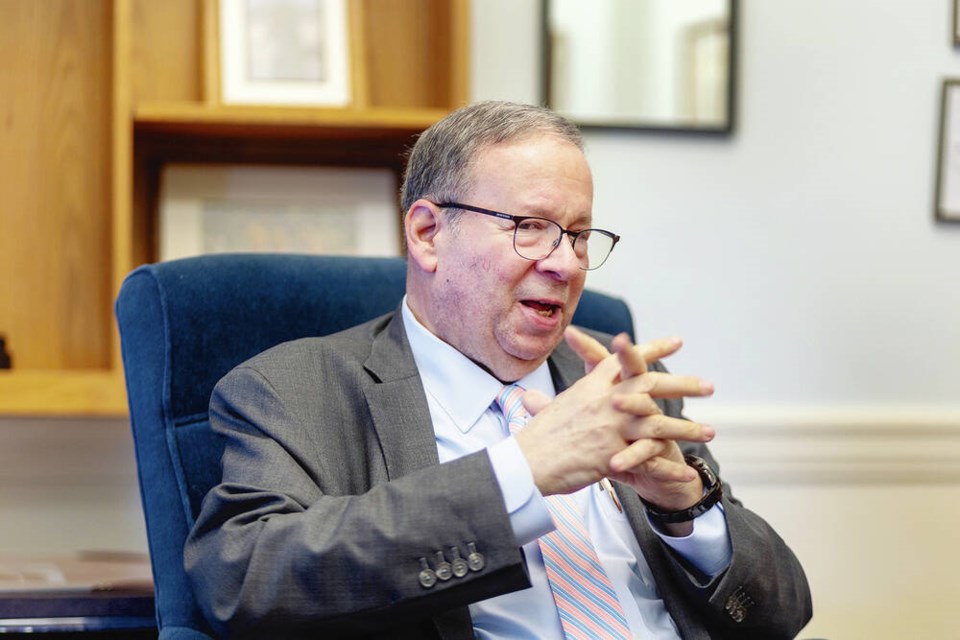Five months into former premier John Horgan’s term as Canada’s ambassador to Germany, British Columbians are still adapting to referring to “His Excellency” rather than “John from Langford.”
U.S. Ambassador to Canada David Cohen can sympathize. He cringes at the protocol-mandated title. Since he confided his dislike, a Canadian friend in Ottawa has taken delight in using it at every opportunity.
On an overnight visit to Victoria he touched base with Lt.-Gov. Janet Austin and Premier David Eby and sat for an interview Thursday.
Asked if he had any professional advice for Horgan, he said: “Don’t try to be someone you’re not. You’re put in that job because you’ve got a lifetime experience in politics. … Don’t be afraid to use your lifetime of skills and do things that maybe a career foreign service officer … wouldn’t do.”
A lawyer by trade, Cohen has civic experience in Philadelphia, was an executive at Comcast and was a top Democratic Party fundraiser prior to his appointment two years ago.
He’s charged with nurturing the Canada-U.S. relationship and lately that involves a lot of lakes and rivers.
“Water and water issues have an increasing importance in that dialogue between the two countries,” he said.
A Great Lakes agreement was reached recently and a significant move was made this week about toxic runoff from Kootenay coal operations in the Elk Valley, where the river flows into the U.S.
The long-standing concerns about toxic selenium have been referred to the International Joint Commission, which has been given two years to research the problem. It’s considered an important advance, although solutions are still many years away.
The big western water issue is the Columbia River Treaty.
Major parts of the historic 60-year-old treaty related mostly to flood control are up for renewal in seven months and there have been 19 rounds of negotiations over the past five years.
The complex deal, ratified by Prime Minister Lester B. Pearson and President Lyndon Johnson, covers water flow, flood control and power generated by the four dams (three of them in Canada) that were built under the treaty.
Cohen said neither side is talking about the treaty expiring.
“It’s about modernizing it. How do we take 60 years of this incredible partnership and relationship and how do we … carry forward what’s worked and how do we fix and improve some of the issues that could use improvement?”
It’s worked well for flood control, “but it has done so as a result of the devotion of more [Canadian] real estate to flood control [110,000 hectares] than Canada would like. …
“I’m comfortable in saying that we’ve reached agreement on that issue.”
The big one still outstanding is on the financial side, regarding the Canadian entitlement to a share of the value represented by the increased generation of power. All the Canadian share goes to B.C.
It was designed as a 50-50 proposition, and amounts to a benefit worth several hundred million dollars a year.
Cohen called the current U.S. offer attractive and said it would provide an “extremely significant financial benefit to B.C. for a very long period of time.”
The Canadian side over the years has been negotiating for more. As drought worries mount, it also wants more flexibility in controlling the flow in its own interests, rather than U.S. flood control.
Cohen said there is a good spirit at the negotiating table, but: “Nothing is agreed to until everything is agreed to.”
On the softwood lumber dispute that stretches back decades, Cohen said the series of penalties the U.S. has imposed over the years (another hike is proposed later this year) are based on an objective assessment that Canada gives preferential treatment to lumber companies that amount to discriminatory practices.
“If Canada is not willing to talk about those and ameliorate them, it’s going to be very difficult to get to a negotiated resolution.”
He said a recent U.S. Commerce Department report listed 40 pages of discriminatory practices over the years, and more than two dozen of them stemmed from B.C. policies.
B.C. has contributed a token amount to ongoing Washington state studies of a Vancouver-Seattle-Portland high-speed rail line and Cohen said he and President Joe Biden are “huge fans” of such projects.
“With the vagaries of air travel these days, I think high speed rail remains an incredibly attractive transportation modality.”
The preliminary funding keeps the idea alive “in case we can ever figure out a financing model that would enable them to be built.”
>>> To comment on this article, write a letter to the editor: [email protected]




